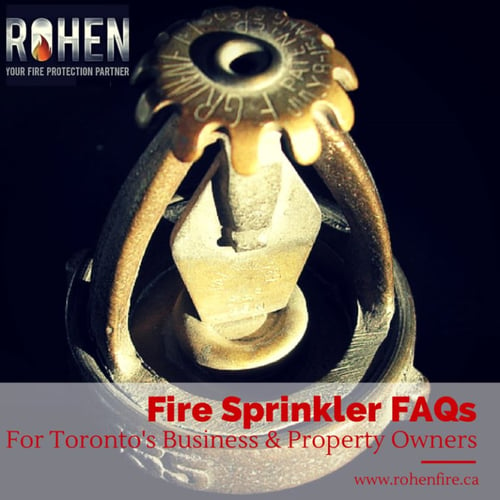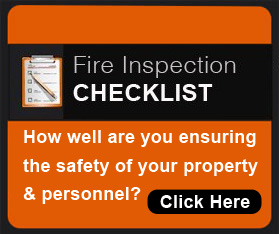Here are our answers to some frequently-asked questions about fire sprinklers. If you are researching fire sprinklers, don't miss this post!

How often does my fire sprinkler system need to be inspected?
There are maintenance items that should be done daily or weekly (per the 2002 version of Form 25-13X of the National Fire Sprinkler Association’s “Form for Inspection, Testing and Maintenance of Preaction and Deluge Fire Sprinkler Systems," click for pdf). The National Fire Protection Association (NFPA)’s codes also recommend control valves be checked weekly to verify they are in the open position unless they are electronically supervised. Guidelines for maintaining and inspecting other systems components may vary under manufacturer’s recommendations or NFPA codes. The complete sprinkler system should be tested four times a year or more.
Do I ever need to have my fire sprinklers inspected outside of the quarterly recommendation?
Yes. If there has been a change to building walls, such as through remodeling, or change of building occupancy or use, you should have fire sprinklers inspected to see if the current design still offers adequate fire protection. You should also retest the entire system when there has been a change in backflow, water meter, or reduction in public water supply.
What do I need to know about sprinkler maintenance to protect my investment?
To ensure you can count on your fire sprinklers when you need them the most, be sure to protect them from paint and keep them away from anything that could disturb them (including anything that might knock into them such as tall stacks of items, or tall motorized vehicles). Also, do not hang anything from them. The glass core of a sprinkler head is fragile.
I’m concerned about the potential expense of fire sprinklers. How can I justify it?
That’s a great question. First of all, there are many types of sprinklers that serve different purposes, with significant variance in price. Be sure to find out which type of sprinkler system would be best for your needs and how much it will cost; it may be significantly less that what you think. Sprinkler costs are generally ballparked at about $1-$2 per square foot in new construction, or 1% of total building costs.
Here are some tips:
- You should have your architect or builder explore potential incentives which may offer credits for fire safety measures to help offset the costs of fire sprinklers.
- It is very likely that fire sprinklers will reduce your insurance rates; check with your carrier (or maybe get a new one).
- Don’t forget to check with your tax professional about potential deductibility of fire sprinkler expenses.
1. Significantly reduced potential property loss (building and contents).
2. Much greater likelihood of stopping and/or containing a fire before it spreads.
3. No other fire prevention option offers better odds of survival for you, your family, your employees, and/or you tenants.
4. Smaller fires and less damage/loss translate to less business interruption and minimized loss of revenue.
5. Potential water damage from a sprinkler is significantly less than it would be from a fire hose, which releases much more water at higher pressure (because by that time, the fire will at a more advanced stage). If there are sprinklers to contain a fire, not only will fire damage be less extensive, it’s also likely that water damage will be less extensive as well.
6. Reduced exposure to non-compliance, fines, and increasingly, criminal charges and lawsuits related to not installing and properly maintaining a fire sprinkler system (which you may be required to do under fire and building code). Requirements vary depending on ownership, location, building history, type of business, etc., but if you are required to have sprinklers in place and maintained and you do not, you could be risking much more than the cost of sprinklers. Take a look at our social activity to view some of the stories we pick up on with increasingly harsh penalties against property owners in high-profile cases.
In sum, be sure you understand the bigger picture implications and true cost over the lifespan of your sprinklers and of your business.
What is the big deal with fire sprinklers? Aren’t fire extinguishers and smoke alarms enough?
Fire sprinklers are commonly considered the most dependable and safest form of fire protection available. When properly designed, installed and maintained, their safety record is very high; it’s common to see performance between 96-99%, even going back to really early records (1886 in Australia and New Zealand, or 1925 in the U.S., based on small pockets of reporting due to incomplete records).
Here are links to two major recent sprinkler studies, one by the National Fire Protection Association (NFPA) and one from Liberty Mutual Insurances’ Property Risk Engineering Group (discussed here). The Liberty Mutual data showed non-sprinklered buildings sustained three times the amount of damage
that sprinklered buildings did ($1.9M versus $638K). When your family or livelihood is on the line, it’s very difficult to ignore the consistently strong performance of sprinklers and settle for another method that is unable to compete statistically. Not to mention, depending on regulations you may be required by code to provide and maintain sprinklers.
The biggest risks related to fire sprinklers are 1) not having them; 2) not having them in the correct places, leaving vulnerable places exposed, and 3) not properly maintaining them (including the #1 cause of sprinkler failure, which is system shutoff preventing operation, such as would occur in the course of a routine inspection- but which should then be turned back on). The last point is a perfect example of why you should be careful to use a fire safety professional who you can trust.
What about sprinklers going off accidentally and ruining everything with water?
This is easily one of the most common misconceptions about fire sprinklers. In movies, fire sprinklers tend to go off all at once. In reality, each sprinkler head acts independently. So, you would expect to have one, maybe two sprinklers go off at once directly over where the fire is starting. The rest of the building wouldn’t be affected. The idea is the first sprinkler will put the fire out before it gets out of control, limiting the damage (from fire, smoke and water) to one area of the building. The rest of the building where there is no fire would not be deluged with water.
Another really important thing to understand about fire sprinklers is that they are activated by heat, not smoke. The heat that activates them varies (you can tell from the color of the fluid in the sprinkler head’s core, if you look closely) but is typically 150-200 degrees Fahrenheit. That means unless there is a deliberate act of vandalism, you shouldn’t expect them to accidentally discharge. In fact, data on the National Fire Sprinkler Association’s “F.Y.I. Fire Sprinkler Facts” (pdf) citing Factory Mutual Research’s loss records peg the likelihood of accidental fire sprinkler discharge at one in sixteen million per year of service. Let’s say you have your sprinkler system in place for 50 years, with 50 sprinkler heads throughout your facility. That’s still only a one in 6,400 risk that one of them will ever accidentally discharge.
Can I perform maintenance tasks myself?
Many jurisdictions require water-based safety systems be maintained by licensed and/or certified professionals. Under NFPA codes: “These tasks shall be performed by personnel who have developed competence through training and experience.” There are a surprising number of components and variables that must be tested and maintained. If not done properly, the whole system’s functionality may be jeopardized. Unfortunately, you may not realize that until it’s too late.
My sprinklers are caked with grease and dust or are green, or are from before 1920. Do they need to be replaced?
Yes. Fire sprinklers in these conditions will not function properly. Brass sprinklers, when exposed to water and chlorine will turn green and corroded. A wax-coated sprinkler would be a good replacement for such conditions. Section NFPA code requires sprinklers pre-dating 1920 to be replaced.
If you have a question that was not addressed in our Fire Sprinkler FAQs, don't hesitate to contact us for additional assistance.
If you enjoyed this post, subscribe to stay informed of fire safety news for Toronto Business and Property Owners.


